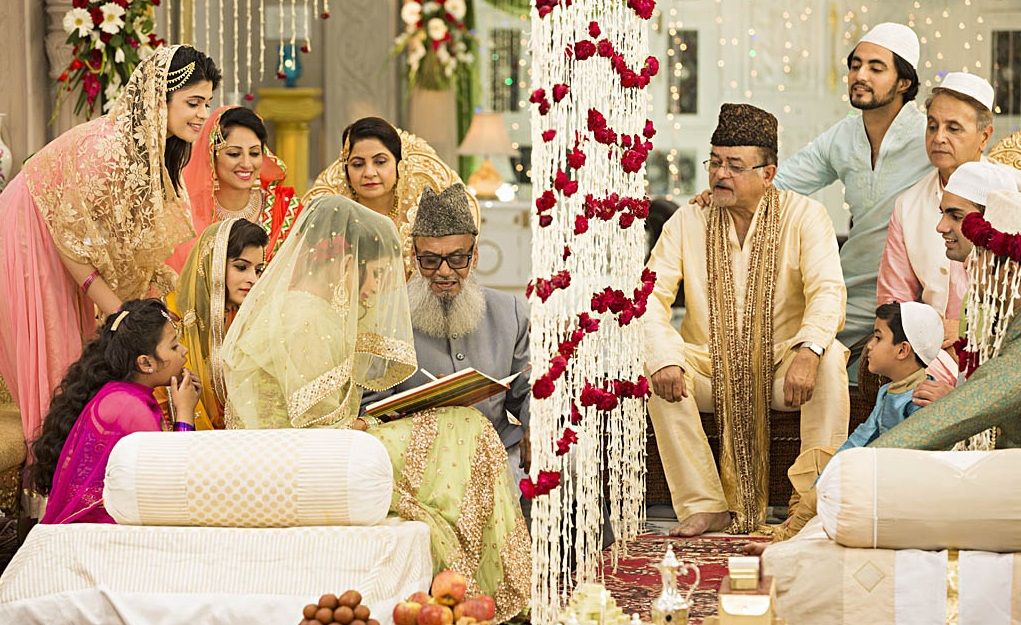Day 1: Henna Harmony – Celebrating the Bride and Her Mom
The enchanting journey of an Ismaili Muslim wedding begins with the Mehndi ceremony, a vibrant celebration where intricate henna designs adorn the bride’s hands and feet. In Ismaili tradition, the richness of the henna color symbolizes the strength and depth of the bride’s future marital love. Central to this event is the bride and mom relationship, as the mother offers blessings and shares in the joyous moments. This intimate gathering fosters a deep emotional connection between mother and daughter, setting a heartfelt and harmonious tone for the upcoming celebrations.
Day 2: Rhythms of Ritual and Revelry – Mother’s Role in the Sangeet
The second day features the Pithi/Sangeet ceremony, a lively blend of music, dance, and sacred rituals. The bride’s mother often takes the lead during the Pithi ceremony, applying a turmeric paste to the bride’s skin. This act symbolizes purification and the bestowal of maternal blessings, highlighting the mother’s pivotal role in preparing her daughter for married life. Following the Pithi, the Sangeet erupts into joyous performances and dances, where the mother may join in, celebrating her daughter’s happiness and the unification of two families. This day beautifully showcases the collaborative spirit between the Ismaili Muslim wedding bride and mom.
Day 3: Sacred Vows and Celebrations – Supporting the Bride
On the third day, the Nikkah ceremony takes place, marking the sacred matrimonial union under Islamic law. The bride’s mother stands as a steadfast pillar of support, witnessing her daughter’s vows and offering prayers for a blessed marriage. During the subsequent reception, the mother often delivers heartfelt speeches, expressing her love and aspirations for the couple’s future. This day underscores the enduring presence and emotional bond between the Ismaili Muslim wedding bride and mom, celebrating their shared journey and the new beginnings ahead.
Day 4: Family Feast and Farewell – A Mother’s Grace
The wedding festivities culminate with the Satada, a luncheon hosted by the bride and groom for their closest family and friends. This relaxed gathering provides an opportunity to reflect on the wedding celebrations in a serene environment. The bride’s mother, alongside the groom’s family, graciously welcomes guests, ensuring that the newlyweds embark on their married life surrounded by love and support. Her role as a host exemplifies the nurturing and unifying presence of the mother in an Ismaili Muslim wedding, leaving a lasting impression of warmth and togetherness.
Embracing Tradition and Modernity
Modern Ismaili Muslim weddings beautifully blend age-old traditions with contemporary elements. Brides and their mothers are increasingly incorporating personalized rituals, innovative event planning, and modern fashion choices while honoring their rich cultural heritage. This harmonious blend reflects the evolving nature of cultural practices, ensuring that the special bond between the Ismaili Muslim wedding bride and mom remains at the heart of the celebration.
The relationship between the Ismaili Muslim wedding bride and her mom is a testament to the enduring blend of tradition and modernity, embodying the essence of cultural evolution in today’s world.





Understanding game odds is key to enjoying any casino experience! It’s great to see platforms like jljl5 catering specifically to Filipino players with a smooth app & diverse games – slots, live casino, everything! Responsible gaming is always the best strategy.
Really interesting read! The focus on user experience in mobile gambling is key – a smooth, quick signup like those at 33wim app makes all the difference. Simplicity is winning! 👍
Start winning today! Sign up and claim your bonus. – https://krakenpartners.net/ru/track/1174
Smart bankroll management is key in any online game! Discovering platforms like 999 phl with fast payouts definitely helps maintain control. The quick verification & GCash options are a huge plus for seamless funding & withdrawals!
Hi, I wanted to know your price.
It’s great seeing platforms like 68wim understand local preferences – crucial for responsible gaming! Balancing fun with mindful play is key, and localized support helps. Remember to set limits & enjoy! 😊
That’s a solid analysis – understanding variance is key to long-term success! Seeing platforms like boss jl offer diverse games and secure logins is a big plus for Filipino players. Definitely worth checking out!